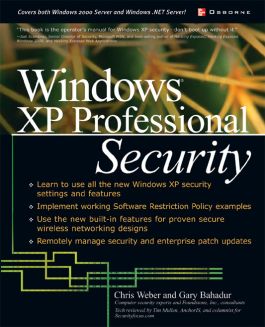Windows(R) XP Professional Security
Step 1. Download Adobe Digital Editions Both PC and Mac users will need to download Adobe Digital Editions to access their eBook. You can download Adobe Digital Editions at Adobe's website here.
Step 2. Register an Adobe ID if you do not already have one. (This step is optional, but allows you to open the file on multiple devices) Visit account.Adobe.com to register your Adobe account.
Step 3: Authorize Adobe Digital Editions using your Adobe ID. In Adobe Digital Editions, go to the Help menu. Choose “Authorize Computer.”
Step 4: Open your file with Adobe Digital Editions. Once you’ve linked your Adobe Digital Editions with your Adobe ID, you should be able to access your eBook on any device which supports Adobe Digital Editions and is authorized with your ID. If your eBook does not open in Adobe Digital Editions upon download, please contact customer service
Part I: Securing the Operating System 1: Security Settings 2: SAFER Software Restriction Policies 3: Registry Security 4: File System Security 5: Operating System Enhancements 6: User and Group Management and Authorization Part II: Network Security 7: IP Security 8: Firewalls 9: Wireless Networking Security 10: Remote Administration and Patch Management Part III: Active Directory, .NET Framework, and Internet Services 11: Active Directory and Group Policy 12: .NET Framework for Administration 13: Internet Services Part IV: Preparing for the Worst 14: Penetration Testing 15: Incident Response Appendix: Default and Recommended Security Settings
2: SAFER Software Restriction Policies 3: Registry Security 4: File System Security 5: Operating System Enhancements 6: User and Group Management and Authorization Part II: Network Security 7: IP Security 8: Firewalls 9: Wireless Networking Security 10: Remote Administration and Patch Management Part III: Active Directory, .NET Framework, and Internet Services 11: Active Directory and Group Policy 12: .NET Framework for Administration 13: Internet Services Part IV: Preparing for the Worst 14: Penetration Testing 15: Incident Response Appendix: Default and Recommended Security Settings
4: File System Security 5: Operating System Enhancements 6: User and Group Management and Authorization Part II: Network Security 7: IP Security 8: Firewalls 9: Wireless Networking Security 10: Remote Administration and Patch Management Part III: Active Directory, .NET Framework, and Internet Services 11: Active Directory and Group Policy 12: .NET Framework for Administration 13: Internet Services Part IV: Preparing for the Worst 14: Penetration Testing 15: Incident Response Appendix: Default and Recommended Security Settings
6: User and Group Management and Authorization Part II: Network Security 7: IP Security 8: Firewalls 9: Wireless Networking Security 10: Remote Administration and Patch Management Part III: Active Directory, .NET Framework, and Internet Services 11: Active Directory and Group Policy 12: .NET Framework for Administration 13: Internet Services Part IV: Preparing for the Worst 14: Penetration Testing 15: Incident Response Appendix: Default and Recommended Security Settings
7: IP Security 8: Firewalls 9: Wireless Networking Security 10: Remote Administration and Patch Management Part III: Active Directory, .NET Framework, and Internet Services 11: Active Directory and Group Policy 12: .NET Framework for Administration 13: Internet Services Part IV: Preparing for the Worst 14: Penetration Testing 15: Incident Response Appendix: Default and Recommended Security Settings
9: Wireless Networking Security 10: Remote Administration and Patch Management Part III: Active Directory, .NET Framework, and Internet Services 11: Active Directory and Group Policy 12: .NET Framework for Administration 13: Internet Services Part IV: Preparing for the Worst 14: Penetration Testing 15: Incident Response Appendix: Default and Recommended Security Settings
Part III: Active Directory, .NET Framework, and Internet Services 11: Active Directory and Group Policy 12: .NET Framework for Administration 13: Internet Services Part IV: Preparing for the Worst 14: Penetration Testing 15: Incident Response Appendix: Default and Recommended Security Settings
12: .NET Framework for Administration 13: Internet Services Part IV: Preparing for the Worst 14: Penetration Testing 15: Incident Response Appendix: Default and Recommended Security Settings
Part IV: Preparing for the Worst 14: Penetration Testing 15: Incident Response Appendix: Default and Recommended Security Settings
15: Incident Response Appendix: Default and Recommended Security Settings
Get comprehensive coverage of XP Professional security with this definitive and focused resource. Work with firewalls and intrusion detection systems, fully utilize XP’s built-in support tools, manage security remotely, and much more.

